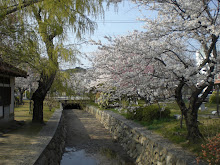I love this movie...
Japanese cinema suffers from much of the same sequel-obsession and lack of originality that plagues Hollywood, but at times there seems to be a bit more willingness to take risks than you see in the big-budget, big-stakes movies coming out of the US. Takashi Miike, for example, is one of Japan's most famous film makers and director of highly acclaimed dramas like Thirteen Assassins or Hara Kiri: Death of a Samurai, family friendly kid movies like The Great Yokai War et al. At the same time, he makes some of the most controversial, ultra-violent and at times bizarre films in Japan. His more risque' work does nothing to interfere with his acceptance as a mainstream filmmaker, and he is not alone in this.
So despite the boring sameness of most films in Japan, there is also a healthy dose of well-budgeted films that are, frankly, out there. This makes me very happy--especially as it led to the creation and relatively healthy support of Death Kappa.
This movie, OH this movie. I love it. It's freaking insane, but I love it.
I guess a brief synopsis is in order, but I'm not sure how much good it will do in conveying how wonderful I think it is.
So here's the story. We start with a young woman, Kanako, trudging back into her small mountain home-town.
We are given to understand that she is coming home from Tokyo, where she had failed as an "Idol," one of the numerous pop singing, bikini clad cuties that are plastered all over Japanese media. She is coming to live with her grandmother, who raised her, but as she approaches the kindly old Kimono-clad woman, a carload of drunken, stupid "City kids" run her over in their convertible.
This is played for laughs.
As the old woman dies in the her granddaughter's arms, her last words are an order to look after the family "kappa shrine."
At this point, we see a short interstitial scene where a Spanish man explains what a Kappa is in an expansive, professorial manner.
This is deadly serious.
We cut to...later?...The same day? I have no idea, but the young woman has taken over her duties at the family shrine, praying and offering cucumbers to the kappa (Kappa love cucumbers. Really.). But when she comes back from her Kappa feeding, she finds two unidentified boys (one of whom appears to be about 10, the other is...25? 30?, but dressed as a child.) have come into the shrine and are listening to a cassette of the only album she released as an Idol. For some reason, this music attracts a real life Kappa, and he comes into the yard to dance to the bubbly pop song. At which point, the three young people then begin cavorting with the hideous monster as the pop song plays...and then it all turns into a Karaoke style music video for the song, complete with lyrics and shots of Kanako in cute outfits. Crying.
I wish I had a video of this. Youtube failed me...it really must be seen to be believed. A cute young Japanese girl running through the surf and splashing water with a man in a rubber Kappa suit, singing lyrics that translate to something like "Today is today, tomorrow is tomorrow, lucky happy! Run by the beach, I'm wearing panties, smiling face, blood spills! Lucky, happy!"
The story progresses into a mystery/horror subplot, where someone is trying to capture the kappa and kidnap the stupid teens who killed Grandma, and eventually are revealed to be a shady group with a sinister plot to create super soldiers using the Kappa. The movie then morphs into a martial arts action flick as Kanako and the Kappa fight their way through these soldiers and end their nefarious scheme. Then, through a bizarre plot device, the movie changes YET AGAIN.
The final part of the film is a "Dai Kaijuu" type man-in-a-rubber-suit giant monster movie. For some reason, the Kappa has become a huge Godzilla-type monster, and starts taking down Tokyo. From there, it follows the usual pattern with the military attacking and failing, the arrival of a new monster and a prolonged battle that eventually becomes a pro-wrestling match in rubber monster suits.
So why do I love this movie? Because it is a quite a successful lampoon of a huge swath of popular movie tropes. We have the pastoral romance of the quiet mountain town and old fashioned values as refuge from the depredations of the big city, destroyed by the intrusion of modernity. We have spy movie/action tropes of secret organizations with sinister plans and the secret powers of our heroes. We have digs at vacuous pop music and over-the-top monster movies and even at horror movie audiences!
The
The best part of all, I think, as that this movie was sold and advertised as a straight horror/monster flick, and it is, beyond any shadow of a doubt, a comedy. Not even a black comedy...there is very little of what you'd call "graphic violence" (any fight or death scenes are filmed without any attempts to hide the fact that the victims are dummies) and that video...wow. The reviews are all pretty bad, and I think part of the reason is this marketing. People seemed to go in expecting a traditional Giant Monster movie, and it's not that at all. I watched it entirely by accident, attracted by the name on TV, and sat in open mouthed amazement for the whole thing--no expectations led to pure enjoyment, I reckon. It really is quite clever, and the fact of its existence makes me hopeful for Japan's entertainment future.




No comments:
Post a Comment